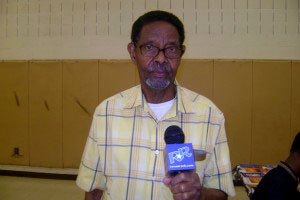Ex-Prime Minister of Somalia found a home in Minneapolis

Photo courtesy of Raxanreeb Online
Ex-Prime Minister Abdirizak Haji Hussein was a pillar in the Somali community. He often spoke at events offering advice to recent Somali immigrants.
March 11, 2014
“Abdirizak Haji Hussein was a great man and a towering Somali patriot. His life should be an example to all Somalis as we seek to rebuild our great nation together,” said Hassan Sheikh Mohamoud, the current president of Somalia during Hussein’s on February 6 memorial. “If there is one lesson we can all draw from his life and career it is the importance of national unity.”
Hussein had lived in Minneapolis for over twenty years before he passed away on January 31st. He was a figurehead in Minneapolis’ Somali community, and a powerful changemaker in the history of Somalia.
“He was an elder in the community. To guide the people of the Somali community: that was his mission,” explained math teacher Mohamed Alabari. “He really was a wise man. He impressed me with his knowledge both of Somali culture and other cultures.”
Alabari remembered him as an “honest, hardworking and truth-telling” man who had always doing the right thing in his life.
“He always had that good heart and wanted to help people in general. He has been a great role model to many people of Somalia and that is why it is a great loss for all of us,” said Hussein’s niece, Marian Hussein, in an interview with Kare 11.
However Hussein’s life was perhaps most influential between the years of 1964 and 1967, when he served as Prime Minister, or second in command, to Somalia’s president Aden Abdullah Osman Daar.
This administration came at an extremely pivotal time in Somalia’s history. “1960 is when the majority of African nations took their independence from the European nations,” explained Somali teacher Dahir Hassan.
Somalia was no different. After being fought over by Italy and Great Britain for years, the country finally became the United Republic of Somalia in 1960.
“His administration was known as the clean up crew. Cleaning up corruptions from the [previous] government,” explained Hassan.
“We all heard about how much [Hussein] moved the country away from corruption and despotism,” added Alabari.
In fact, what both Alabari and Hassan say was one of the most defining characteristics of the administration was its lack of corruption. “For a country that was destroyed as much as Somalia, he was always doing the right thing in his life, from the beginning to now” said Alabari.
Hussein will be remembered as a lawful leader who stayed true to the constitution. While this seems like a given for the United States, this was rare during the time that Hussein was in power.
In an interview with the Center for Policy Analysis and Research last May, Hussein continually cited adherence to the constitution as the key to a successful country. “People have agreed on rules; a constitution has been written; other laws have been legislated. These [laws] are the way, because many people gathered and agreed to have them as laws… They should be implemented as they are without any deviation from left or right,” Hussein explained.
“During our administration, from 1964-1967, I can’t say that we were 100% free of corruption, but I think compared to other African countries, Somalia was a very much less corrupted country” he added.
Another aspect that set Hussein and President Daar apart was the peaceful transition of power that occurred after they were voted out of office. The two made history as the first heads of state to step down peacefully in post colonial Africa.
After his term as Prime Minister was over, Hussein served as the Somali ambassador to the United Nations. He later sought political asylum in the United States after a socialist regime took control in Somalia.
Both Hassan and Alabari described Hussein as incredibly down to earth. “Even though he was prime minister you saw him walking in the streets,” remembered Hassan.
In Minneapolis he made himself accessible to the Somali community, and frequently stopped to talk to people in the streets. “I met him several times here in Minneapolis just walking” recalled Hassan. “It is amazing [to see] that great personality to get from being a powerful person in Somalia… to [meeting him] walking on the streets of Minneapolis.”
In Minneapolis he frequently advised Somali immigrants on how to survive and thrive in Minnesota. “He [told] us how to make the best of everything, and that this is the best place we could be” said Alabari.
“Through his experience and knowledge of Somali community and the Somali people, and the East African community he was always bringing words of wisdom… He was always in the center of the Somali community,” recalled Hassan.
“I think gathering around Abdirizak’s body to bring him to the dignified place he belonged to allowed many Somalis to gather to forget the Civil War and their divisions and to forgive themselves,” said Hassan.





